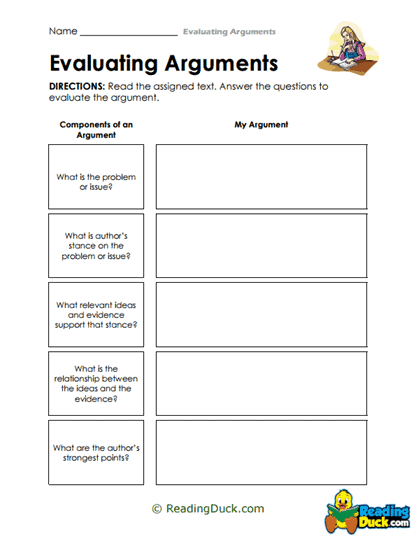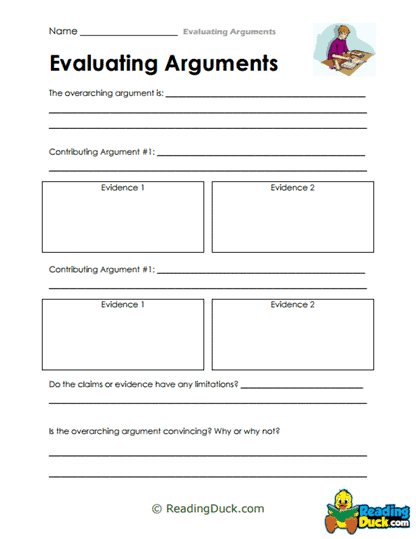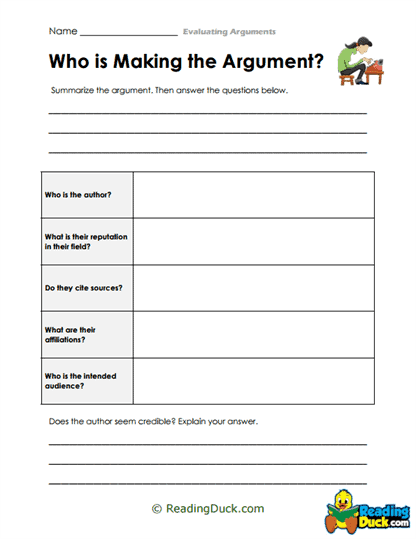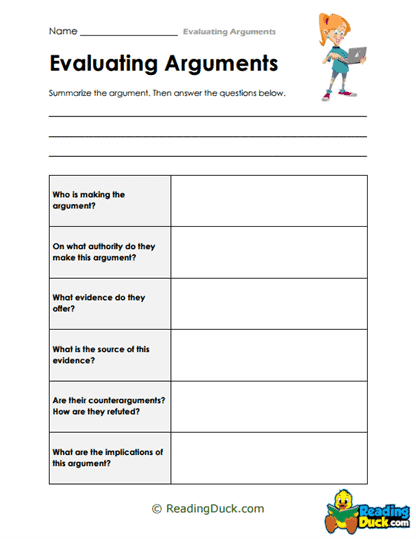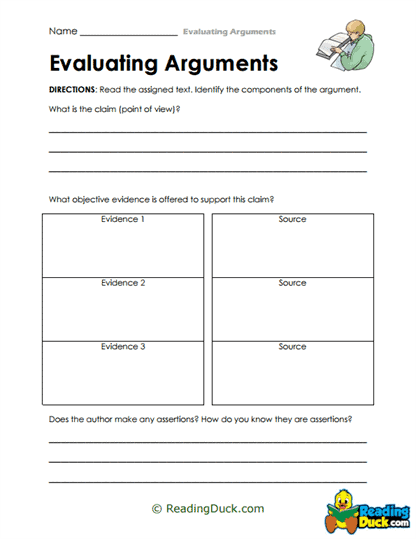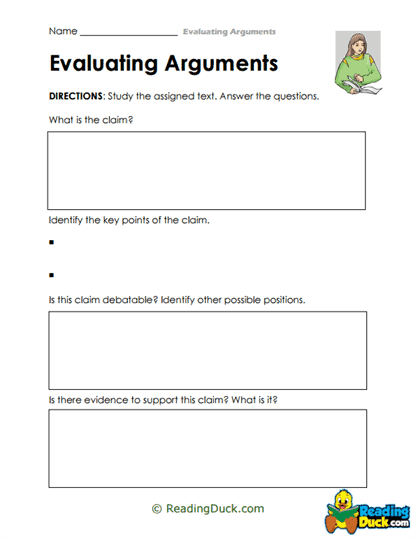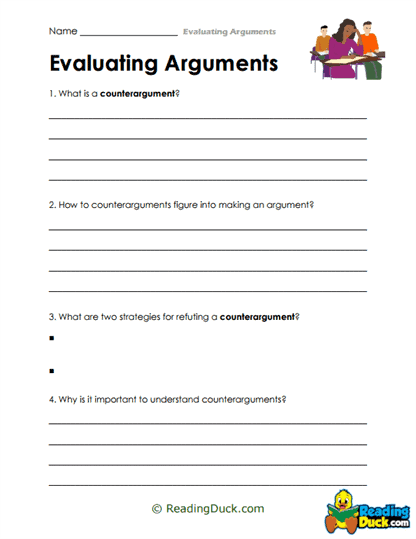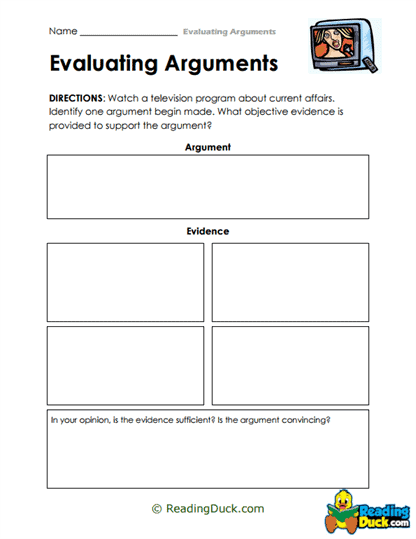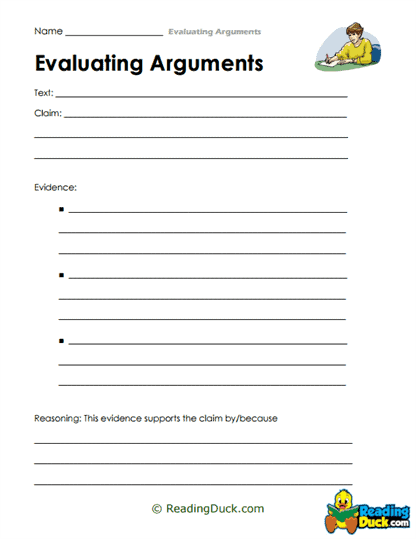Evaluating Arguments Worksheets
About Our Evaluating Arguments Worksheets
Our Evaluating Arguments Worksheets are designed to help students critically assess the strength, relevance, and validity of arguments presented in various forms of writing. These worksheets guide students through the essential process of evaluating claims, identifying evidence, and determining whether an argument is sound and convincing. By providing structured practice in analyzing arguments, these worksheets help students strengthen their writing and critical thinking skills, enabling them to engage more effectively in academic debates, persuasive writing, and everyday decision-making.
Each worksheet is presented in a PDF format, making them easy to download, print, and integrate into classroom or home learning environments. Every worksheet comes with a downloadable answer key to facilitate quick assessment and feedback, ensuring that students and educators can monitor progress and improvement. These worksheets are ideal for students from middle school to high school and are adaptable for various learning levels.
Understanding the Process of Evaluating Arguments
Evaluating arguments is a crucial skill in academic writing and everyday life. It involves carefully examining the logic and evidence behind a claim, determining whether the argument is supported by credible facts, and identifying any flaws or biases that might undermine the argument’s validity. Whether analyzing a persuasive essay, a political speech, or a research paper, students must learn to think critically about the information they encounter.
Our Evaluating Arguments Worksheets focus on several key components:
- Identifying claims: Students learn how to distinguish between main arguments and supporting points, ensuring they understand what is being argued.
- Assessing evidence: The worksheets help students analyze the evidence provided, teaching them to evaluate whether the evidence is reliable, relevant, and sufficient to support the claim.
- Detecting fallacies: Students are trained to recognize logical fallacies, such as ad hominem attacks or false cause-effect relationships, which weaken an argument.
- Understanding counterarguments: Strong arguments often acknowledge and refute opposing viewpoints. These worksheets help students evaluate whether the author has effectively addressed potential counterarguments.
For example, a worksheet might ask students to evaluate the arguments in a newspaper editorial, focusing on whether the evidence presented is credible and whether the author has successfully countered opposing views. This type of exercise deepens students’ understanding of what makes an argument convincing or flawed.
Encouraging Creativity and Independent Thought
Our Evaluating Arguments Worksheets foster creativity and independent thinking by encouraging students to critically engage with the material and form their own conclusions about the strength of an argument. These worksheets prompt students to think deeply about the implications of the claims being made, encouraging them to question assumptions, explore different perspectives, and propose alternative interpretations.
How these worksheets promote creative thinking:
- Exploring multiple viewpoints: Evaluating arguments often involves considering counterarguments and opposing perspectives. This encourages students to think creatively about the issue at hand, considering different angles and possible outcomes.
- Challenging assumptions: Students are encouraged to question the validity of the evidence and the assumptions behind an argument. This process fosters an inquisitive mindset, helping students approach arguments with a critical eye.
- Generating new ideas: As students become more comfortable evaluating arguments, they also become better at forming their own well-reasoned opinions and generating new ideas for essays, projects, and debates.
For example, a worksheet might present a controversial topic with several opposing viewpoints and ask students to evaluate the strengths and weaknesses of each side. This type of exercise helps students think creatively about how to construct and evaluate arguments, making them more effective communicators.
Integrating Evaluating Arguments Worksheets into Broader Lessons
The Evaluating Arguments Worksheets can be seamlessly integrated into a variety of academic units and projects, helping students develop skills that are essential for success in subjects such as English, history, social studies, and science. These worksheets serve as a valuable resource for strengthening writing and analytical skills while also preparing students for more complex assignments.
Ways to incorporate these worksheets into larger projects:
- Essay writing: These worksheets provide excellent preparation for persuasive and argumentative essays, where students must construct logical, evidence-based arguments. By practicing argument evaluation, students learn how to build strong, coherent essays that anticipate and address counterarguments.
- Debate preparation: Use the worksheets to help students prepare for class debates, where they must defend their positions and challenge opposing viewpoints. Evaluating arguments is a key skill in debate, as students must analyze their opponents’ reasoning and respond with clear, evidence-based rebuttals.
- Literary analysis: In literary studies, students can use these worksheets to evaluate the arguments made by characters or authors, deepening their understanding of themes, motivations, and moral dilemmas in literature.
- Research projects: In subjects like history or science, students can use the worksheets to critically evaluate the arguments made in research papers or historical documents, learning to assess the reliability of sources and the validity of claims.
For instance, in a history class, students might analyze a primary source document and evaluate the author’s argument, considering the historical context, evidence provided, and potential biases. This activity encourages students to engage critically with historical texts and develop their own informed conclusions.
Complementary Activities for Reinforcing Argument Evaluation Skills
To enhance the effectiveness of our Evaluating Arguments Worksheets, teachers can pair them with complementary activities that allow students to apply their critical thinking skills in various contexts. These activities encourage collaboration, discussion, and creative problem-solving, reinforcing the lessons learned through the worksheets.
Suggested complementary activities:
- Group discussions: After completing a worksheet, students can engage in group discussions where they share their evaluations of the argument. This activity encourages collaboration and exposes students to different perspectives.
- Debate competitions: Organize class debates where students must evaluate and defend their arguments using evidence and logical reasoning. The worksheets can be used as preparation for these debates, helping students refine their arguments and anticipate counterpoints.
- Real-world case studies: Present students with real-world case studies or current events and ask them to evaluate the arguments made by different stakeholders. This helps students apply their skills in practical, real-world contexts.
- Creative writing assignments: Encourage students to write their own persuasive essays or op-eds on a current issue, using the skills they’ve developed through the worksheets to construct and evaluate their arguments.
These activities provide students with opportunities to apply their critical thinking skills in dynamic and engaging ways, ensuring that the lessons learned through the worksheets are reinforced in a variety of contexts.
Ideal Grade Levels and Adaptability for Different Learning Environments
The Evaluating Arguments Worksheets are suitable for a wide range of grade levels, making them an adaptable tool for teachers working with students of varying abilities. These worksheets can be used in both middle and high school classrooms, with adjustments made to suit the complexity of the arguments and texts being analyzed.
Recommended grade levels:
- Middle School (Grades 6-8): Introduce students to the basics of argument evaluation, focusing on simple texts and straightforward claims. These worksheets help younger students develop foundational critical thinking skills.
- High School (Grades 9-12): Challenge older students with more complex arguments, requiring them to evaluate nuanced claims and evidence. These worksheets prepare high school students for advanced writing tasks, such as persuasive essays and research papers.
The worksheets can also be adapted for use in a variety of learning environments, from traditional classrooms to homeschooling settings and independent study programs. Teachers can adjust the difficulty of the exercises to match their students’ abilities, ensuring that all learners can engage meaningfully with the material.
Supporting Real-World Application and Project-Based Learning
Our Evaluating Arguments Worksheets are an excellent resource for project-based learning, allowing students to apply their critical thinking skills to real-world contexts and collaborative projects. By integrating these worksheets into larger projects, students gain valuable experience analyzing and constructing arguments in meaningful ways.
Project-based learning ideas:
- Research projects: Use the worksheets to help students evaluate the arguments made in research papers or articles, teaching them to assess the credibility of sources and the strength of the evidence.
- Debate preparation: Incorporate the worksheets into debate projects, where students must defend their positions and evaluate the arguments of their opponents.
- Creative writing projects: Assign students persuasive writing tasks where they must build strong arguments and counter opposing viewpoints, using the skills they’ve developed through the worksheets.
These projects provide students with hands-on experience in evaluating and constructing arguments, ensuring that they are prepared to engage critically with the world around them.
Conclusion
Our Evaluating Arguments Worksheets offer a valuable resource for students seeking to develop their critical thinking, writing, and analytical skills. With their focus on logical reasoning, evidence-based analysis, and thoughtful evaluation, these worksheets prepare students to engage confidently in academic writing, debate, and real-world decision-making. Whether used in the classroom, for independent study, or as part of a larger project, these worksheets provide students with the tools they need to evaluate arguments effectively and construct their own persuasive, well-supported claims.
